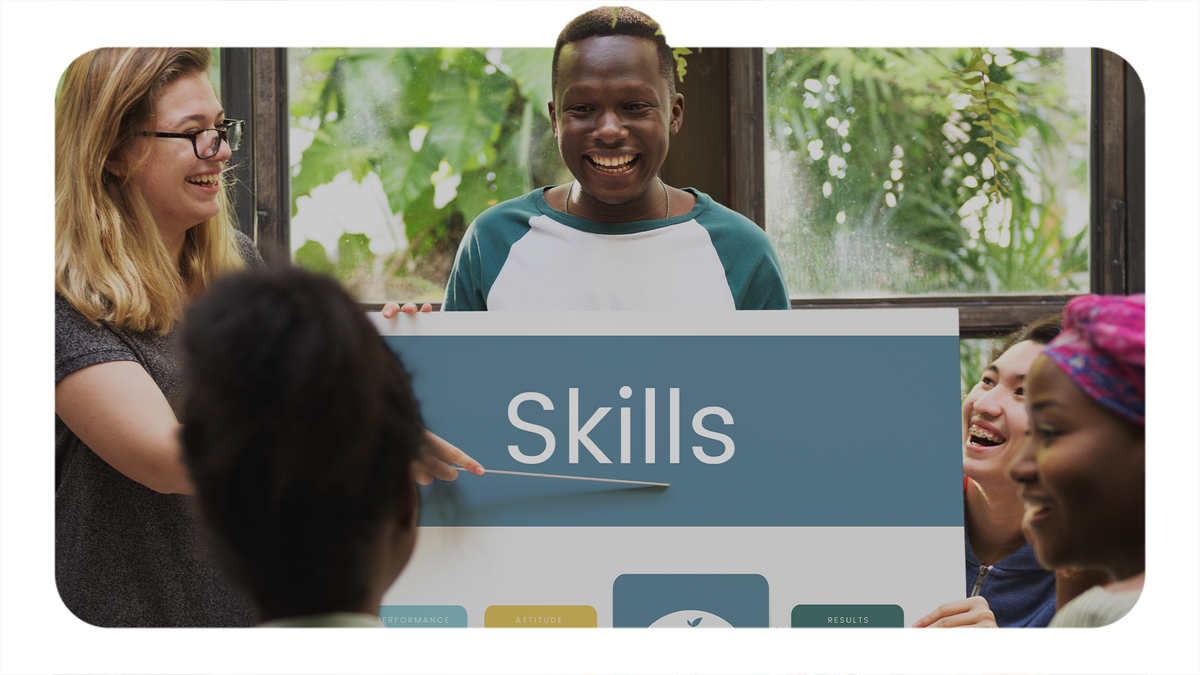As we enter 2025, 'soft' skills are no longer just a nice-to-have; they’re becoming essential. From thriving in remote work environments to leading diverse teams, soft skills quickly replace hard skills as the most valued assets in today’s job market.
But what exactly makes them so crucial?
Let’s find out!
In the rapidly evolving workplace of 2025, soft skills have taken center stage. Employers are now recognizing that technical abilities alone are not enough; it's the human-centric skills that truly make a difference. But why are soft skills so important today? Let's explore.
What Are Soft Skills?
Soft skills are personal attributes that enable someone to interact effectively and harmoniously with others. Unlike technical skills (also known as hard skills), which are job-specific and measurable, soft skills are more about how you relate, communicate, and collaborate.
Think of them as the traits that make you a great team player, an empathetic leader, or a clear communicator.
Soft skills are essential because they make technical abilities more impactful. You might be an expert coder or a brilliant strategist, but if you can’t communicate well or manage your time effectively, your skills might go unnoticed or underutilized. In 2025, when collaboration and human-centric roles are at their peak, soft skills are undeniably the new hard skills.
Soft Skills vs. Hard Skills: The Difference
Soft skills and hard skills are both crucial in the modern workplace, but they serve distinct purposes and are valued differently. Understanding the difference between soft skills and hard skills is essential for professionals aiming to succeed in their work environments.
What Are Hard Skills?
Hard skills are technical abilities or knowledge that are specific, measurable, and often gained through formal education or training. Examples include coding, data analysis, financial modeling, and technical writing. They are typically verified through certifications, degrees, or direct assessment.
What Are Soft Skills?
On the other hand, soft skills are interpersonal and social abilities that influence how individuals interact and work with others. These skills include communication, problem-solving, teamwork, adaptability, and leadership. Unlike hard skills, they are more challenging to quantify and are often developed through life experiences rather than formal training.
| Aspect | Hard Skills | Soft Skills |
|---|---|---|
| Measurement | Quantifiable (e.g., through tests, certifications) | Subjective — assessed through observation & feedback |
| Acquisition | Gained through structured education or training programs | Developed through social interactions & real-world experiences |
| Application | Task-specific (e.g., using software, coding, accounting) | Versatile — useful across different situations (e.g., teamwork, communication) |
| Importance | Essential for job eligibility | Crucial for long-term success, especially in leadership & team collaboration |
Why the Focus on Soft Skills?
As automation and AI take over repetitive technical tasks, soft skills become the defining factor for human-centric roles.
While hard skills might get someone hired, soft skills often determine whether they thrive and advance in their career.
Employers now look for a blend of both, but soft skills often make the difference when technical abilities are comparable between candidates.
Combining Both Skill Sets
Imagine an IT specialist who excels in software development (a hard skill) but lacks communication skills (a soft skill). Despite their technical expertise, they may struggle to explain solutions to non-technical colleagues, leading to project delays.
In contrast, a technically proficient IT professional who also communicates well can bridge gaps between departments, fostering more collaborative and successful project outcomes.
While both soft skills and hard skills are important, the modern workplace increasingly favors individuals who demonstrate a balance between technical proficiency and interpersonal abilities. Hard skills are measurable and teachable; soft skills are more nuanced and often acquired through experience. This distinction between soft skills vs hard skills is crucial when preparing for a modern job market.
In 2025, many employers are looking beyond resumes and technical skills, assessing how candidates handle stress, adapt to new technologies, and lead diverse teams.
20 Most In-Demand Soft Skills in 2025
Here are the top 20 soft skills employers seek in 2025:
Top Soft Skills for Professional Success
Communication
The ability to convey thoughts clearly, both verbally and in writing, while also actively listening to others.
Emotional Intelligence
The capacity to manage and express emotions wisely and empathetically while recognizing others' emotions.
Adaptability
Adjusting to changing conditions and being flexible when plans shift, especially in dynamic environments.
Problem-Solving
Approaching complex situations with creativity and logic to find practical solutions.
Leadership
Inspiring and guiding teams to achieve goals while fostering a positive and inclusive environment.
Critical Thinking
Analyzing situations objectively and making informed decisions based on evidence and reasoning.
Teamwork
Working effectively with others, valuing diverse perspectives, and contributing to group success.
Creativity
Thinking outside the box to develop innovative ideas and solutions that fuel growth and change.
Time Management
Prioritizing tasks to meet deadlines efficiently while maintaining high standards of quality.
Conflict Resolution
Constructively handling disagreements and focusing on solutions to maintain a positive environment.
Networking
Building professional relationships that foster collaboration, mentorship, and career opportunities.
Decision-Making
Evaluating options and making timely, impactful choices by balancing logic with intuition.
Self-Motivation
Driving oneself to achieve goals without external pressure by setting personal targets and staying focused.
Resilience
Recovering from setbacks with determination, maintaining enthusiasm and commitment through adversity.
Negotiation
Reaching mutually beneficial agreements by understanding all perspectives and finding common ground.
Cultural Awareness
Respecting cultural differences and communicating effectively in diverse, global teams.
Public Speaking
Confidently presenting ideas and information in a clear and persuasive manner to various audiences.
Empathy
Understanding others’ emotions and experiences to build strong, supportive professional relationships.
Mentoring
Helping others grow professionally by sharing knowledge, offering advice, and encouraging development.
Organizational Skills
Structuring tasks and maintaining order to improve workflow, efficiency, and productivity.
How BrainCert Supports Soft Skills Development
BrainCert’s platform is more than an LMS, it’s a dynamic digital ecosystem that promotes soft skill development through practical, interactive, and collaborative tools.
Here's how each core feature aligns with building the top soft skills needed in today’s workplace:
Virtual Classroom
A real-time, collaborative environment where learners and instructors interact face-to-face, virtually.
Helps build:
- Communication: Live audio/video discussions, hand-raising, chat, screen sharing, and presentation tools improve verbal and non-verbal communication.
- Public Speaking: Learners can present in front of peers using presenter mode or breakout rooms.
- Teamwork & Leadership: Breakout rooms simulate project groups, ideal for leadership practice and collaboration exercises.
Course Authoring Tools
A robust editor that allows instructors to build custom courses with video, SCORM, quizzes, assignments, and discussions.
Helps build:
- Critical Thinking: Scenario-based lessons with assessments that challenge learners to reflect and respond.
- Decision-Making: Branching course paths (adaptive learning) let learners choose based on reasoning.
- Organizational Skills: Structured modules train learners to manage their own learning journey.
Discussion Boards + Social Hub
Spaces where learners ask questions, share ideas, and interact with peers outside the classroom.
Helps build:
- Emotional Intelligence & Empathy: Learners share experiences, respond to others, and reflect on feedback.
- Cultural Awareness: Interaction with diverse learners promotes inclusivity and broadens perspective.
- Networking: Learners build professional connections organically.
Assignments & Peer Review
Instructors can assign real-world projects, essays, or tasks, and allow for peer feedback.
Helps build:
- Problem-Solving: Assignments often mimic workplace challenges that require logic and creativity.
- Feedback Skills: Reviewing peer submissions enhances communication and coaching ability.
- Time Management: Deadlines and task tracking tools keep learners focused and accountable.
Assessment Engine
Advanced quizzes, scenario-based questions, and interactive exams to evaluate understanding and decision-making.
Helps build:
- Critical Thinking: Learners must analyze situations, not just memorize facts.
- Self-Motivation: Feedback and results help learners see where they stand and push forward.
Gamification Tools
Built-in features like badges, points, levels, and leaderboards that reward engagement and achievement.
Helps build:
- Self-Discipline: Learners stay motivated and goal-focused.
- Resilience: Encourages retrying, improving scores, and sticking with challenges.
- Consistency: Reward structures help learners develop habits and routines.
Mentorship & Group Learning
Private groups and co-instructor roles support mentoring, coaching, and collaboration.
Helps build:
- Leadership: Mentors guide others, manage communication, and resolve issues.
- Mentoring Skills: Mentees grow by observing and receiving support.
- Interpersonal Skills: Close-knit interactions promote trust and empathy.
Webinar Hosting
Run live sessions or workshops on soft skill topics like leadership, time management, or team dynamics.
Helps build:
- Engagement: Learners participate in interactive polls, Q&A, and discussions.
- Lifelong Learning: Sessions keep professionals upskilled and adaptable.
- Confidence: Hosting or presenting in webinars builds presence and clarity.
Analytics & Progress Tracking
Admins and instructors can view soft skill indicators like participation rates, assignment feedback, and group involvement.
Helps build:
- Self-Awareness: Learners get insight into their learning behavior.
- Continuous Improvement: Helps instructors tailor activities to address skill gaps.
Example:
Say you’re teaching "Effective Team Communication."
Using BrainCert:
- Create a course with interactive video content on communication styles.
- Add a scenario-based quiz on workplace conflict.
- Use breakout rooms in a live class for a mock team meeting.
- Encourage learners to post reflections in the discussion forum.
- Assign a peer-reviewed feedback task where learners assess each other’s communication techniques.
Result?
By combining interactive lessons, real-time collaboration, ongoing feedback, and social engagement, BrainCert empowers learners to develop the communication, leadership, teamwork, and problem-solving skills essential for thriving in 2025 and beyond.

The Shift from Hard Skills to Soft Skills
In the past, hard skills were often seen as the backbone of a successful career. These skills, whether coding, data analysis, or engineering, were quantifiable and easily measurable.
But as technology evolves and workplace dynamics shift, the focus is moving toward something much harder to quantify: soft skills.
Why Is This Shift Happening?
The rise of automation and AI has played a significant role. As machines take over routine and technical tasks, human skills like creativity, leadership, and emotional intelligence are becoming the real differentiators. Employers are now looking for candidates who can adapt, collaborate, and navigate complex social interactions, skills that machines simply cannot replicate.
The Changing Workplace Landscape
Remote and hybrid work models are becoming the norm. This shift requires professionals to excel not just in technical areas but also in communication, adaptability, and self-management. Without strong soft skills, even the most technically proficient employee may struggle to collaborate effectively in a virtual environment.
The Modern Employer’s Perspective
Employers now understand that hard skills are teachable, but soft skills are often inherent and developed through experience. This makes them harder to acquire quickly, increasing their value. Companies are prioritizing candidates who demonstrate resilience, problem-solving, and leadership, as these traits indicate a capacity to thrive in evolving roles.
Soft Skills: Taking the Lead
Consider a software developer who excels at coding but struggles with teamwork. While they might be able to build efficient systems independently, modern projects require collaboration, cross-departmental communication, and collective problem-solving. A developer who also possesses strong communication and leadership skills is far more valuable to the team and the company as a whole.
In 2025, the balance has shifted;
it’s no longer just about what you can do, but how you do it.
For decades, hard skills, the technical abilities and specific knowledge required to perform tasks, have been prioritized. However, as automation and AI take over repetitive tasks, employers are increasingly valuing the human touch. This shift highlights why soft skills are important in the workplace.
To Conclude
In the present scenario, knowing what to do isn’t enough. It’s how you communicate, adapt, lead, and collaborate that really makes the difference. These soft skills are what turn good professionals into great ones. BrainCert helps you build those skills through interactive learning paths, real-time collaboration, and practical tools like webinars, feedback, and gamification.
Whether you're training a team or working on your own personal growth, BrainCert makes developing soft skills practical, interactive, and most importantly, achievable.
Because in the end, it’s the human side of learning that sets you apart. And BrainCert is here to help you master it.






